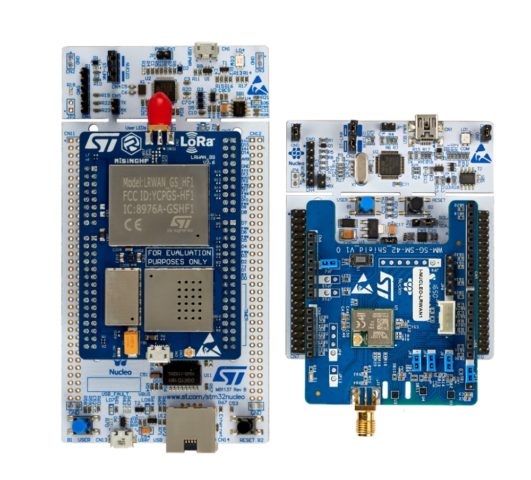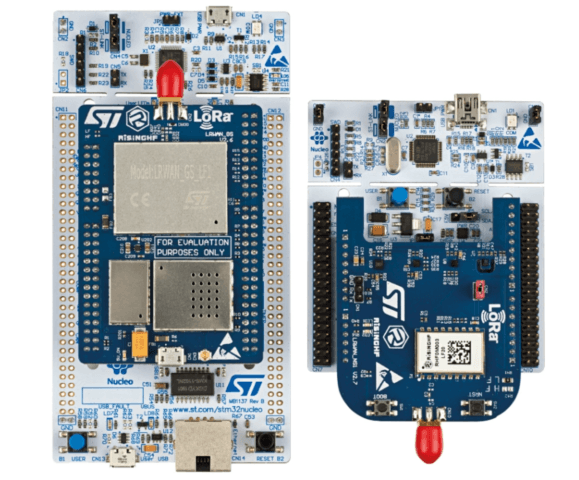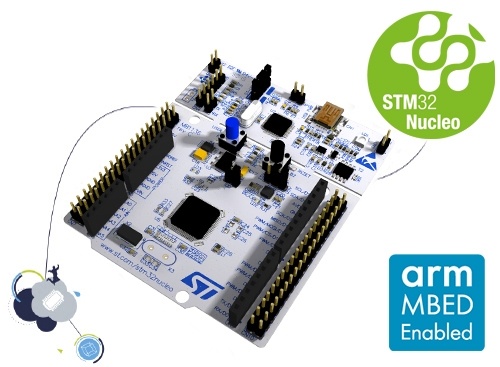STMicroelectronics has recently announced the launch of a new set of LoRa Development packs, which are not only affordable, but they are aiming to a large pool of users from big organizations, small companies, hackers, engineers, students, and hobbyists.
The ready-to-use development packs are aimed for applications bent on leveraging LoRa ’s long-range, low-power wireless IoT connectivity for tracking, positioning, metering, and many related applications.

STMicroelectronics is releasing the P-NUCLEO-LRWAN2 pack and P-NUCLEO-LRWAN3 pack. Both packs provide a complete LoRaWAN development kit, and they include gateways, end-nodes, and ST tools, which are all based on the STM32 Nucleo evaluation boards.
The LoRa gateway on both packs is based on the STM32 Nucleo-144 development board, NUCLEO-F746ZG. The STM32 Nucleo-144 development board with STM32F746ZG MCU supports Arduino, ST Zio, and Morpho connectivity. The Gateway header pins are exposed out to facilitate more development, and they support interfacing with LoRaWAN network-server providers LORIOT, Actility, myDevices Cayenne for LoRa and The Things Network.

The Nodes in both packs are based on the NUCLEO-L073RZ Nucleo-64 board that features the STM32L073RZT6 ultra-low-power MCU and come with a battery socket for easy mobility. An expansion board for the nodes is also available with each pack, which comes with a set of motion and environmental sensors.
The packs come in two different frequency groups. The P-NUCLEO-LRWAN2 pack is available for high-frequency (868MHz/915MHz/923MHz) ISM bands while the P-NUCLEO-LRWAN3 pack is available for low-frequency (433/470MHz) ISM regions.

The node expansion board for the P-NUCLEO-LRWAN2 pack is the I-NUCLEO-LRWAN1 node expansion board designed by USI. It is based on the STM32L0 module and includes LSM303AGR MEMS e-compass, LPS22HB pressure sensor, and ST HTS221 temperature and humidity sensor.
The node expansion board for the P-NUCLEO-LRWAN3 pack is the I-NUCLEO-LRWAN1 node expansion board designed by USI. It is based on the STM32L0-powered RisingHF module RHF0M003 and includes the ST LSM6DS33D accelerometer, ST LPS22HB pressure sensor, and ST HTS221 temperature and humidity sensor.
Both development packs are available for $99 each, and users can purchase it online from the various approved distributors. The STM32 ecosystem tools like the Keil MDK-ARM, STM32CubeMX MCU initializer, and configurator can be used for working with the packs.

I enjoy writing about the latest news in the areas of embedded systems with a special focus on AI on edge, fog computing, and IoT. When not writing, I am working on some cool embedded projects or data science projects. Got a tip, freebies, launch, idea, gig, bear, hackathon (I love those), or leak? Contact me.
Support CNX Software! Donate via cryptocurrencies, become a Patron on Patreon, or purchase goods on Amazon or Aliexpress





Thanks for the pointer to these kits, Ayo. I was in a hurry to get to the most important part, the price, so after reading “affordable”, “students” and “hobbyists” I was shocked to see a price tag of $99. However, it’s worth pointing out again that:-
EACH OF THE KITS INCLUDE BOTH A GATEWAY AND A NODE, ANTENNAS AND FIRMWARE
…so you’re basically all set to start experimenting as soon as you get a kit.
The gateways appear to ship with firmware for the Loriot provider as default, but binaries for Actility and TTN are available from st.com.
The nodes appear to come with a pre-installed binary with an AT command stack in case you don’t feel up to rolling your own just yet.
So, with a gateway, a node board with multiple sensors and firmware all ready to go, $99 looks like a pretty attractive price after all (…and no, I have no connection with STMicro, apart from as a customer for a couple of their previous boards).
-John-
Thanks for the observation.
Yeah, I believe the packs are worth the cost because most gateways alone cost slightly above 99$ alone.
One thing to try will be to find out how reliable the gateway is. I guess it is more of an indoor gateway than an outdoor gateway.
but what can I do with them? are these open-source kit(schematic, source code,etc), otherwise just running its binary code leaves not too much to play with soon.
i would prefer an open-source kit, e.g. a gateway running openwrt and the nodes running freertos(or AT modules with no source code, nodes are fine without code actually).
The announcement specifically says that the gateway is running a proprietary binary as delivered, but they do have three different versions available.
The Nucleo board that the gateway is based on has a big “ARM MBED Enabled” sticker (on the Nucleo page showing the bare development board). The board also has an attached programmer/debugger, so you don’t need anything extra there, either.
STMicro have their own development package which I -believe- is like the Microchip MPLab suite for PICs; you can use it for free, but the licence terms forbid commercial distribution unless you buy a specific commercial licence (I may be totally wrong on that, so check before you take the leap).
So, to answer your initial question, when you receive the boards you can power them up and have a working configuration of one gateway and one node (with sensors), out of the box, sending data from those sensors to the LORIOT cloud. You can download a different binary (for free) from the STMicro site and burn it to the gateway to change to The Things Network or to Actility (and no, I’ve never heard of LORIOT or Actility before, either). Once you’re happy that the boards work as demo units, you should then be able to break out MBED and program the gateway to do whatever you want it to.
– I just checked the PlatformIO boards list for STMicro Nucleo and it contains the STM32F746ZGT6 processor, so it looks like we’re good to go. 🙂